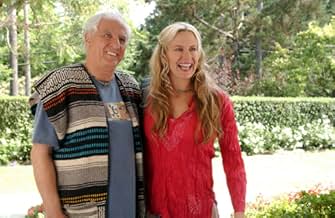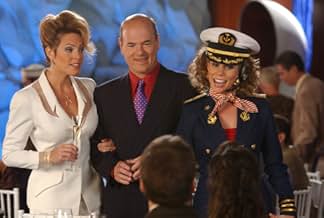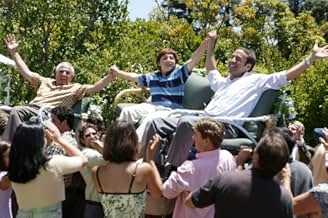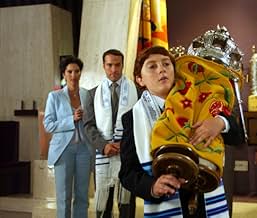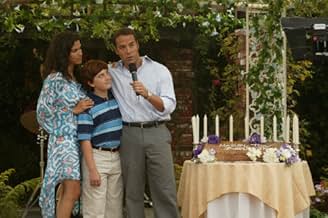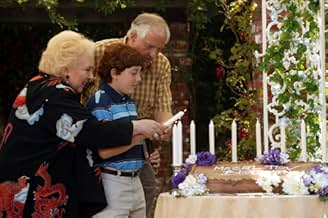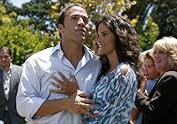IMDb RATING
5.4/10
3.4K
YOUR RATING
A 13-year-old boy uses his upcoming bar mitzvah to reconcile the strained relationship between his father and grandfather.A 13-year-old boy uses his upcoming bar mitzvah to reconcile the strained relationship between his father and grandfather.A 13-year-old boy uses his upcoming bar mitzvah to reconcile the strained relationship between his father and grandfather.
- Awards
- 2 nominations total
Marc John Jefferies
- Tim
- (as Marc John Jeffries)
Britt Robertson
- Ashley Grunwald
- (as Brittany Robertson)
- Director
- Writer
- All cast & crew
- Production, box office & more at IMDbPro
Featured reviews
Adam (Jeremy Piven) and Joanne Fiedler (Jami Gertz) have their son Benjamin (Daryl Sabara)'s bar mitzvah coming up. They attend Adam's former best friend and Hollywood agent partner Arnie Stein (Larry Miller)'s son Zachary's grand bar mitzvah. It's Brentwood and the Fiedlers decide to top it. Casey Nudelman (Cheryl Hines) is the planner. Benjamin has a crush on Ashley Grunwald and Karen Sussman is his know-it-all classmate. Rose (Doris Roberts) is his grandmother. He doesn't like his parents' outlandish plans and invites his wacky estranged grandfather Irwin (Garry Marshall) who is living with Sacred Feather (Daryl Hannah) on an Indian reservation.
This dysfunctional family is wacky. Their problems are not that relatable or actually that funny. It's broadly sit-comish. For example, it isn't enough for Irwin and Sacred Feather to be hippies but they have to live on an Indian reservation. Everybody has to be wacky on the next level. I would also like to like Daryl Sabara more but he doesn't have quite the right adorable loveability. There is a nice message in the end but I would have preferred better laughs.
This dysfunctional family is wacky. Their problems are not that relatable or actually that funny. It's broadly sit-comish. For example, it isn't enough for Irwin and Sacred Feather to be hippies but they have to live on an Indian reservation. Everybody has to be wacky on the next level. I would also like to like Daryl Sabara more but he doesn't have quite the right adorable loveability. There is a nice message in the end but I would have preferred better laughs.
Look, I am 18 and Jewish. I saw this with 2 of my closest also Jewish friends. Of the three only one of us had a barmitzva. But none the less I am convinced that you will find this movie funny if you are Jewish. This was the conclusion my friends and I came up with. This movie has a target audience, and that is the audience that to any extent of the way can relate to it. Its a little slow and at some times feels as if you are missing a scene. Nevertheless the jokes are there, and I did laugh. As a coming of age story I would give it a 5 but as a Jewish comedy I would give it a 9, so that brings us to a seven. Jermey is funny as always and a couple camio roles that I don't wish to reveal really brings the whole movie together and at the same time has you brawling in your seats.
I am Jewish, and saw this with a Non-Jewish friend. Neither of us thought this was any good. I wasn't offended by any of the humor...there just wasn't any. It wasn't funny. Garry Marshall clearly must have called in a lot of favors to get this film made for his son, as we see Darryl Hannah, Richard Benjamin, and Neil Diamond being dragged into this eminently forgettable film.
The plot was alternately clichéd and incredibly unrealistic. The only positives I'll give to this movie are:
1. Jami Gertz - Absolutely perfect as the Jewish mother. My friend's wife is exactly the same.
2. Former Penthouse/Playboy model Sandra Taylor is actually quite good in a supporting role as the "trophy" Mrs. Stein. She hasn't acted in awhile, and certainly not in a film like this. And she actually gets on the cover of the movie poster too! I doubt she's going to be the next Diane Lane, but I do think this role will deservedly give her career a shot in the arm.
The plot was alternately clichéd and incredibly unrealistic. The only positives I'll give to this movie are:
1. Jami Gertz - Absolutely perfect as the Jewish mother. My friend's wife is exactly the same.
2. Former Penthouse/Playboy model Sandra Taylor is actually quite good in a supporting role as the "trophy" Mrs. Stein. She hasn't acted in awhile, and certainly not in a film like this. And she actually gets on the cover of the movie poster too! I doubt she's going to be the next Diane Lane, but I do think this role will deservedly give her career a shot in the arm.
This is a coming-of-age story with a twist. There is more than one person coming-of-age.
In a nutshell, it is the story of an angst-ridden thirteen year old boy whose troubles are doubled by his pending bar mitzvah.
His father (Jeremy Piven) is a Hollywood agent intent on turning the bar mitzvah into a recruiting event to keep and grow his client base. This is complicated when his former partner, played by Larry Miller, throws a mega bar mitzvah for his own son, with the same intention in mind.
Piven's angst at creating the perfect bar mitzvah/recruitment event is made worse by the arrival of his hippy-like father (Gary Marshall), who is attached to an early 40-something New Ager (Daryl Hannah) and teaching English to children on the Navajo reservation. I guess it's supposed to be funny, just looking at Marshall and Hannah. Marshall's and Piven's characters are estranged, the father having walked out on Piven and his mother (Doris Roberts) 26 years earlier.
We have an angst-ridden triangle between the three men: grandfather, father, and grandson. (The trinity in a Jewish story?) Indeed, the only struggles in the story are between men. The men have no plot difficulties or unresolved issues with the women, or the women with each other. Frankly, there is no way men can have unresolved issues and not emotionally involve the women in their lives. It's just not realistic, not even in a satirical sense.
I gave this film a "4" because of the story. It has a significant flaw. There is just no moment when I felt a human connection with the three men. I was shown all the events that led to the all-important climax, and then I felt nothing. It was like discovering I had swallowed a Chicklet instead of Viagra. No emotion. No "ah ha!" moment. I was more concerned that there wasn't enough butter on my popcorn. And because I felt no emotional connection with or between the three men, I did not feel their catharsis. And that's a real problem for a coming-of-age film. There were a few nice moments between the grandfather and grandson, but that was it.
Not good.
Regardless of what several "mainstream press" critics wrote and to the writer's and director's credit, I didn't see one stereotype. There were a few undeveloped characters, caricatures really, but that, too, is the fault of the storytellers it's lazy, not malicious.
Why it happened this way, I have no idea. Maybe they were forced to cut the film strangely or leave out things they wanted put in, due to money constraints. It just doesn't work.
The acting was fine, featuring some of the best actors on television today. That made it marginally watchable. Maybe television is where this film should have been sold. I see this as a Starz film. Not quite HBO or Showtime material. IFC or Sundance will be its home in about six months.
I counsel the writer and director to learn from this experience. You have to flesh out your characters more and let us in on their inner struggles. Don't tell us. Show us. That's what makes drama and comedy work, especially on film. Make us as tense as the characters appear because of the conflicts within the situation, and then resolve the audience's and characters' tensions at the same time. To paraphrase Woody Allen, if it's a comedy, make us bend with the character; if it's a drama, make us break.
For example, don't match Richard Benjamin's Bill-O'Reilly-loving rabbi character with Marshall's tolerant grandfather, and do nothing with it. That could have been some very funny stuff as the two men synthesize their worldviews. Instead pffft. Nothing.
And finally, have a bigger theme something the audience can sink its teeth into. I'm still not quite sure what it is. (And I won't venture a guess, because I don't want to spoil the ending for anybody.) Go back and watch how Chaplin created and then unknotted tension in "City Lights", how Sam Woods did it in "A Night at the Opera", how Marshall did it in "The Flamingo Kid" (another coming-of-age story), or even how it's done in the simplest episode of Piven's "Entourage". Have somebody check the treatment and script thoroughly for theme, conflict and catharsis. Then try it again.
I don't want this to sound angry or mean-spirited. But the situation within the film was just lousy with potential for a better film. It was all wasted. And that's a shame.
In a nutshell, it is the story of an angst-ridden thirteen year old boy whose troubles are doubled by his pending bar mitzvah.
His father (Jeremy Piven) is a Hollywood agent intent on turning the bar mitzvah into a recruiting event to keep and grow his client base. This is complicated when his former partner, played by Larry Miller, throws a mega bar mitzvah for his own son, with the same intention in mind.
Piven's angst at creating the perfect bar mitzvah/recruitment event is made worse by the arrival of his hippy-like father (Gary Marshall), who is attached to an early 40-something New Ager (Daryl Hannah) and teaching English to children on the Navajo reservation. I guess it's supposed to be funny, just looking at Marshall and Hannah. Marshall's and Piven's characters are estranged, the father having walked out on Piven and his mother (Doris Roberts) 26 years earlier.
We have an angst-ridden triangle between the three men: grandfather, father, and grandson. (The trinity in a Jewish story?) Indeed, the only struggles in the story are between men. The men have no plot difficulties or unresolved issues with the women, or the women with each other. Frankly, there is no way men can have unresolved issues and not emotionally involve the women in their lives. It's just not realistic, not even in a satirical sense.
I gave this film a "4" because of the story. It has a significant flaw. There is just no moment when I felt a human connection with the three men. I was shown all the events that led to the all-important climax, and then I felt nothing. It was like discovering I had swallowed a Chicklet instead of Viagra. No emotion. No "ah ha!" moment. I was more concerned that there wasn't enough butter on my popcorn. And because I felt no emotional connection with or between the three men, I did not feel their catharsis. And that's a real problem for a coming-of-age film. There were a few nice moments between the grandfather and grandson, but that was it.
Not good.
Regardless of what several "mainstream press" critics wrote and to the writer's and director's credit, I didn't see one stereotype. There were a few undeveloped characters, caricatures really, but that, too, is the fault of the storytellers it's lazy, not malicious.
Why it happened this way, I have no idea. Maybe they were forced to cut the film strangely or leave out things they wanted put in, due to money constraints. It just doesn't work.
The acting was fine, featuring some of the best actors on television today. That made it marginally watchable. Maybe television is where this film should have been sold. I see this as a Starz film. Not quite HBO or Showtime material. IFC or Sundance will be its home in about six months.
I counsel the writer and director to learn from this experience. You have to flesh out your characters more and let us in on their inner struggles. Don't tell us. Show us. That's what makes drama and comedy work, especially on film. Make us as tense as the characters appear because of the conflicts within the situation, and then resolve the audience's and characters' tensions at the same time. To paraphrase Woody Allen, if it's a comedy, make us bend with the character; if it's a drama, make us break.
For example, don't match Richard Benjamin's Bill-O'Reilly-loving rabbi character with Marshall's tolerant grandfather, and do nothing with it. That could have been some very funny stuff as the two men synthesize their worldviews. Instead pffft. Nothing.
And finally, have a bigger theme something the audience can sink its teeth into. I'm still not quite sure what it is. (And I won't venture a guess, because I don't want to spoil the ending for anybody.) Go back and watch how Chaplin created and then unknotted tension in "City Lights", how Sam Woods did it in "A Night at the Opera", how Marshall did it in "The Flamingo Kid" (another coming-of-age story), or even how it's done in the simplest episode of Piven's "Entourage". Have somebody check the treatment and script thoroughly for theme, conflict and catharsis. Then try it again.
I don't want this to sound angry or mean-spirited. But the situation within the film was just lousy with potential for a better film. It was all wasted. And that's a shame.
Interesting thing about having seen 'Keeping Up with the Steins' on a Sunday at Fallbrook in the Valley - there was a fieldtrip of some school that had seen fit to come see the film as a group, then hold a sort of Q&A in the lobby. Ages of the folks in attendance ranged from 12 to about 60 and over. I love being in a full theatre when going to a film, particularly a comedy as you'll get laughs out of people that become infectious and actually make seeing the film that much better of an experience.
Another interesting thing about the 'Steins' film: while Jeremy Piven and the young hero of the film are the driving characters, the lasting memories of a film-goer actually belong to Gary Marshall & Doris Roberts. The backstory of their relationship, how it affected Piven, and how they've let by-gones be by-gones while Piven clutches to his old grudges is beautifully and deftly handled by the director. Marshall delivers the father figure as likable to an audience as the characters he created on network television back in the 70's.
One more interesting thing about the 'Steins': you don't have to be Jewish to appreciate the humor, you just have to recognize the strengths and failings of every human being represented in these characters.
Another interesting thing about the 'Steins' film: while Jeremy Piven and the young hero of the film are the driving characters, the lasting memories of a film-goer actually belong to Gary Marshall & Doris Roberts. The backstory of their relationship, how it affected Piven, and how they've let by-gones be by-gones while Piven clutches to his old grudges is beautifully and deftly handled by the director. Marshall delivers the father figure as likable to an audience as the characters he created on network television back in the 70's.
One more interesting thing about the 'Steins': you don't have to be Jewish to appreciate the humor, you just have to recognize the strengths and failings of every human being represented in these characters.
Did you know
- TriviaWhile shooting this movie, Daryl Sabara was also studying for his own Bar Mitzvah. The Haftorah portion that his character chants in the movie was Sabara's actual Bar Mitzvah portion.
- GoofsWhen Benjamin is reading his Haftorah at his Bar Mitzvah, he fails to say the required prayer that precedes it. Instead, he goes right into the Haftorah portion itself.
- Quotes
Rose Fiedler: Shamu is Jewish?
- Crazy creditsIn the first set of end credits, Mark John Jefferies is listed as a cast member, but in the final comprehensive set, he is listed as Marc John Jeffries.
- SoundtracksFreilach
Traditional
Performed and Arranged by Gregori Schecter's Klezmer Festival Band
Courtesy of Opus 1 Music Library
Under license from ARC Music
Details
- Release date
- Country of origin
- Official sites
- Languages
- Also known as
- Lucky 13
- Filming locations
- Production companies
- See more company credits at IMDbPro
Box office
- Gross US & Canada
- $4,339,241
- Opening weekend US & Canada
- $621,000
- May 14, 2006
- Gross worldwide
- $4,409,374
- Runtime
- 1h 30m(90 min)
- Color
- Sound mix
- Aspect ratio
- 1.85 : 1
Contribute to this page
Suggest an edit or add missing content







